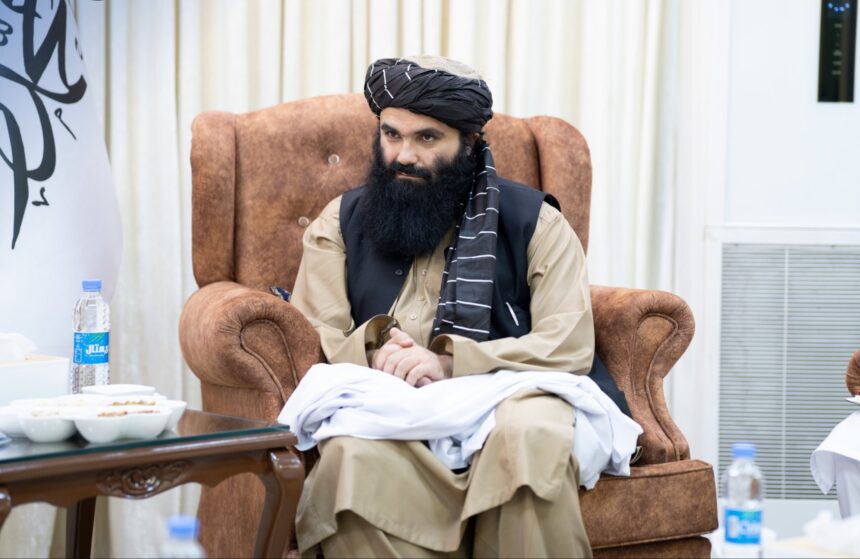RASC News Agency: In a stark declaration that underscores the Taliban’s deepening autocracy, Sirajuddin Haqqani, the Taliban’s Minister of Interior and a senior leader within the group’s power hierarchy, has warned that any disobedience toward Supreme Leader Hibatullah Akhundzada’s decrees should be regarded as an act of treason against both the regime and the Afghanistani people. Haqqani delivered his remarks during a high-level gathering of tribal elders and local figures in the eastern province of Paktia, where he emphatically stated that the Taliban’s insurgency was not motivated by a hunger for power, but rather, what he termed a righteous jihad against “infidelity and corruption.” He insisted that the movement’s objective was to enforce Islamic law not to monopolize power.
“Power must not become a tool for oppression and exploitation,” Haqqani claimed, in what many observers see as a profound contradiction, given the Taliban’s record of brutally suppressing dissent and systematically eliminating democratic freedoms since returning to power in 2021. Haqqani further emphasized that “loyalty to the Islamic Emirate is meaningless without full adherence to the supreme leader’s directives,” warning that any lack of submission to Akhundzada’s orders constitutes betrayal of the ruling system and the nation itself. His comments arrive at a time of increasing international condemnation and internal dissatisfaction, particularly over the Taliban’s rigid enforcement of social control, systematic exclusion of women from public life, growing economic hardship, and their failure to deliver on even the most basic services and infrastructure.
In its most recent quarterly report, UN Secretary-General António Guterres identified the Taliban’s authoritarian governance as one of the key factors behind Afghanistan’s deteriorating humanitarian conditions. The report notes that, despite a public pledge of “general amnesty”, the Taliban continue to engage in arbitrary arrests, extrajudicial killings, and targeted harassment of former officials and perceived opponents. Between February and April 2025, the United Nations documented at least four politically motivated assassinations and ten arbitrary detentions conducted by Taliban forces violations that blatantly contradict the group’s claims of clemency and moderation.
Haqqani also admitted to deep structural challenges, revealing that the Taliban leadership faced with a shrinking revenue base and chronic mismanagement has ordered a 20% reduction in the civil service workforce, including members of the security forces. He said the decision came at the direct instruction of Akhundzada, aimed at reducing government spending. These sweeping austerity measures have further crippled public institutions, especially in health, education, and agriculture. Experts warn that such cuts have left millions of Afghanistani citizens particularly women and children in peril, with essential services either suspended or functioning in name only.
In an apparent attempt to quell growing discontent, Haqqani pledged the launch of various infrastructure projects in Paktia, including the construction of roads, water dams, power lines, and transportation facilities. However, these promises came without any specific timelines, budget transparency, or clarity regarding resource allocation. Local sources report that many of these initiatives including those aimed at connecting remote districts of Paktia, Paktika, and Khost have already stalled due to internal disputes and lack of funding. Some believe the limited work that has begun is privately financed through Haqqani’s own networks, raising troubling concerns about corruption, patronage, and misuse of unofficial funds.
Community representatives at the Paktia meeting voiced a growing sense of frustration, calling for urgent attention to the collapse of public education, health care, agriculture, and the near-complete absence of job creation for youth. Specific demands included the reconstruction of the Gardez–Patan road, rehabilitation of the Nari and Machlagh dams, and the building of schools and health clinics. While Haqqani acknowledged these appeals and promised a review, he provided no roadmap, timeline, or assurance of delivery a familiar pattern under Taliban governance, where rhetoric routinely replaces action.
Since the Taliban’s return to power in August 2021, the group has prioritized ideological enforcement over national reconstruction. Experts say that the regime’s singular focus on rigid interpretations of religious law, coupled with the concentration of power in a reclusive and unaccountable leadership, has crippled Afghanistan’s post-conflict recovery. The regime’s inability or unwillingness to respond to the social, economic, and humanitarian needs of the population is now viewed by many analysts as a deliberate strategy to maintain control through dependency, fear, and isolation.
In the words of a Kabul-based political analyst (name withheld for security reasons):
“The Taliban leadership talks of loyalty, but loyalty to what? A broken state? An economy in freefall? A system where women are erased, youth are jobless, and basic rights are punishable by violence?” As Haqqani calls for obedience, many in Afghanistan and beyond are instead demanding accountability.






